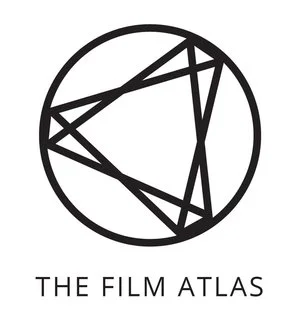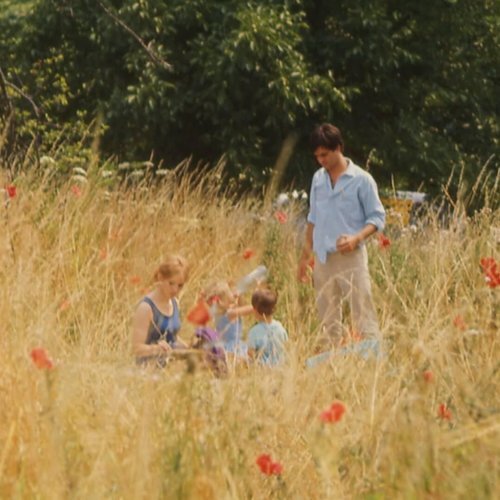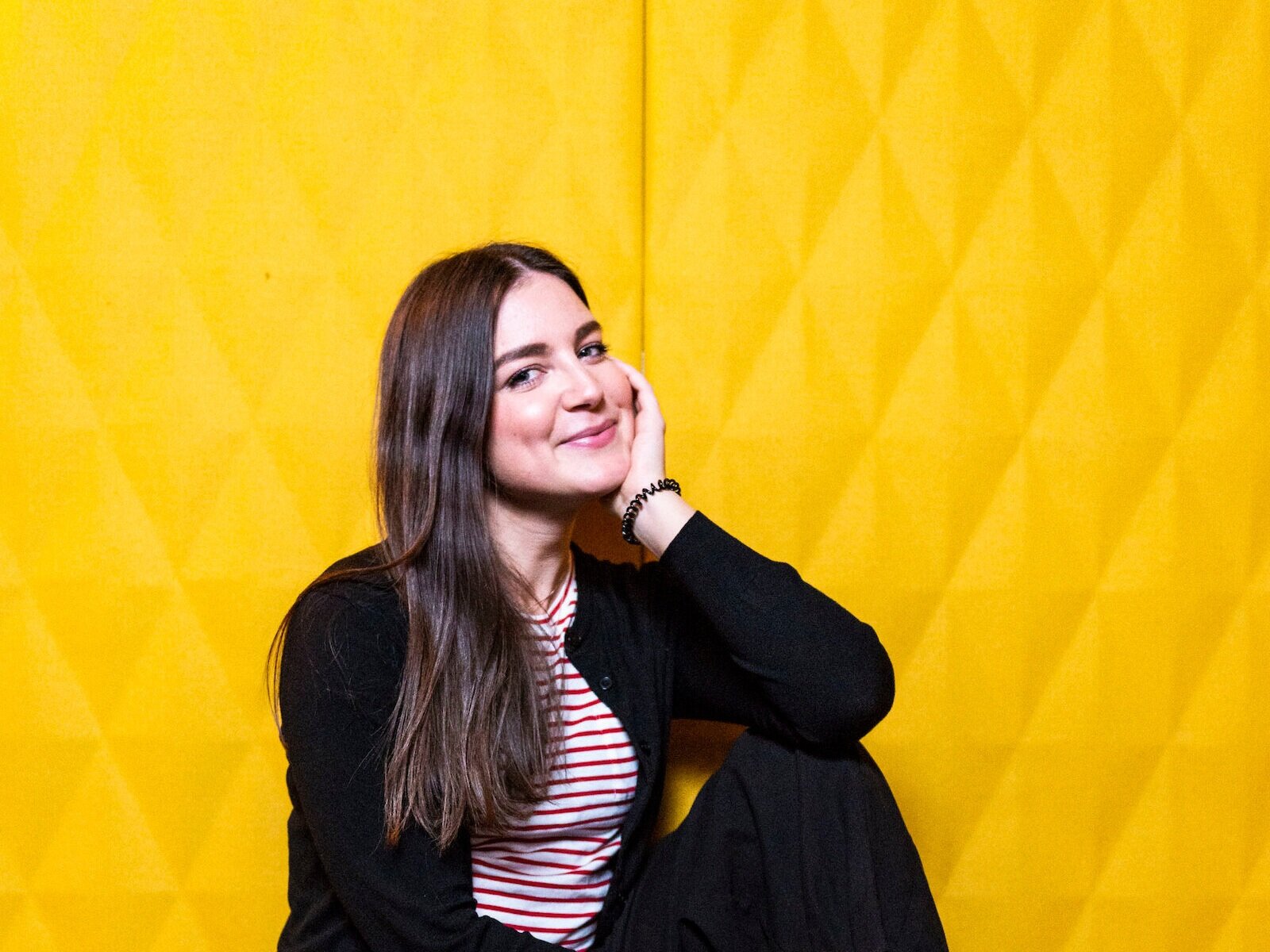Hind Meddeb: Empathy and Documentary Cinema
By Genevieve Citron | 14.02.2021
Hind Meddeb.
“It is a great pleasure to see you again!” says Hind Meddeb in her elegant and friendly way. Meddeb, a French journalist turned documentarian is sitting in her Paris home afront a wall of books that made up her father’s library. The first time we met was at the Toronto International Film Festival (TIFF), when Meddeb’s film, Paris Stalingrad (2019), was selected as part of the festival’s documentary programme. “The film travelled all around the world. It was presented in New Zealand, in Copenhagen, all over Europe. In Ghana, Sudan, Morocco, Tunisia, and Egypt. And also the United States! So it was really crazy! It was a crazy year of travelling with the film.” Meddeb says, her face lit up by the blue light of her computer. It’s a different meeting than our last, which took place in a lively rooftop cafe in Toronto. Of course though, it will have to do, and it does plenty.
Meddeb’s storytelling is deeply relational, she forms strong bonds with the people she films. “I don’t have brothers and sisters, Souleymane became a brother to me,” she says of the central subject in Paris Stalingrad, which documents refugees as they attempt to seek asylum in an inhospitable Paris. The film follows Souleymane -- who escaped from Darfur to France -- and many others along their journey for safety. When I ask her about what drove her to tell this story, Meddeb is deliberate and genuine: “I did this because it was happening downstairs. I was seeing injustice in Paris and I thought it [was] impossible that something like this could happen. Paris is famous for having refugees from all over the world. The painter Chagall, the writer Vladimir Nabokov, the dancer Rudolph Nureev, the singers Aznavour and Sylvie Vartan from Armenia. The filmmaker Raul Ruiz and the writer Carmen Castillo from Chile. The Bulgarian philosopher Tzvetan Todorov, the Afghan writer Atiq Rahimi.” Meddeb is protective of the expatriates who, taking refuge in France, have become cultural icons. “When the asylum seekers were attacked by the police, it was a contradiction of the city I was raised in. I was so surprised, but I shouldn’t have been. Refugees have always struggled against racism.”
Meddeb is concerned with her country’s fraught history with human rights, an issue that resurfaces like clockwork. “On 17 October 1961, the French police fired on Algerian protesters and killed between 150 and 200 people. And we can never forget that in 1942, thousands of Jews were deported to concentration camps. They were denounced by the French people in collaboration with the police. When I walk through the Marais neighbourhood in Paris, I sometimes pass a school where 200 Jewish children were deported to death in 1942. This happened just a few decades ago,” she says. Acutely aware of the duality of her city, Meddeb continues: “That’s Paris’s contraction. It is a melting pot city with a long history of racism.”
Souleymane in Paris Stalingrad. Dir. Hind Meddeb. 2019.
Communication is key for Meddeb. In addition to French and English, she speaks Arabic, which she learned in childhood from her Moroccan-Tunisian family. In language and in spirit, Meddeb can connect with the people she films. This is obvious in Paris Stalingrad where the audience has the pleasure of hearing poetry read aloud by Souleymane, as if in speaking to Meddeb he is speaking to his oldest friend. “I organized poetry nights in Arabic and French. I did my best to translate Sudanese poetry and also to help these beautiful people to meet famous writers, artists, and musicians in Paris. I wanted to connect them to the Parisian artistic scene so they could start a new life here.”
“As soon as we could, [friends and myself] were hosting people at home so that they could rest and have some time to reconstruct and start the administration process to [seek] asylum. The second step -- after some of these people got papers and were recognized as refugees coming from countries in war, where there is no freedom of speech -- [was] to program poetry nights and concerts at the Institut du Monde Arabe. It was a great success so we decided to continue!” Meddeb says, enthused. She is intent and passionate about her new friends’ art. She tells me about the upcoming installation that she will be bringing to Les Rencontres d'Arles this summer. Beaming with pride, Meddeb explains that the installation, which utilizes footage she captured while filming in Khartoum, will be presented in tandem with the photographs of eight Sudanese artists who documented the revolution: “In a way, my videos will be in dialogue with the photographs. Through images and sound, we are going to reconstruct Khartoum's revolutionary sit-in. We want to show Western audiences the 57-day civilian occupation of the streets surrounding the military headquarters leading up to the 3rd of June, 2019.”
Meddeb’s focus on Khartoum does not stop with the installation. It will be the subject of her upcoming film: Sudan Revolution Stories. “In Spring 2019, I decided to travel to Sudan to bring back images of the Sudanese revolution to my friends of the Sudanese diaspora in Paris. Images of their revolution,” Meddeb tells me with determination. Many of the people Meddeb filmed during the making of Paris Stalingrad were Sudanese nationals fighting for freedom and trying to escape war. She shares that while revolution began to stir in Sudan, they attentively followed the movement on social media. “They were so excited but they couldn’t go back home. It was too dangerous as they didn’t know if the uprising would succeed” she remembers aloud, recounting the mixed emotions during this time.
“I arrived in Khartoum in May 2019 and I filmed the last fifteen days of the democratic sit-in. This was a revolutionary city: an incredible place where the Sudanese people were trying to make their dreams come true,” Meddeb says. While she initially planned to stay in Khartoum for a few months, she had to cut her journey short after two weeks. “[The city] was destroyed by the army on June 3rd [with] a massacre. Thank god, I was travelling back to France two days before because they started arresting journalists.” While mournful, Meddeb is charged with purpose as she recounts the details of the massacre, carried out by the Sudanese army and the Janjaweed, the same militia responsible for the genocide in Darfur: “I was so worried because there was no internet [in Khartoum] during these days. I didn’t know if some of the people I [had been] filming every day were killed. Unfortunately, one of the young boys I was filming disappeared, and we think he was killed.”
The massacre is clearly heart wrenching for its place in the cycle of violence that grips Sudan. “Most of the kids in the Janjaweed Militia are very young, they’re between 14 and 16. Most of them are orphans of the war [who] become soldiers and are incorporated into the militia. In French we say enfant soldat, child soldiers,” Meddeb explains. “They don’t really understand what they’re doing.”
“The crazy thing is that the massacre was mainly filmed by these soldiers who were taking selfies like it was a video game. They were laughing and killing people, and they put these images on the internet. In a way, the massacre was documented by the people who [carried out] the massacre,” says Meddeb, sharing how this violence, actioned by victims of a similar cruelty, is harshly uncanny. “Some of the revolutionaries, [who] are characters in the new film, were filming with their phones in the panic and running away. They were putting their lives in danger to document this. So there are two very different types of footage.”
Throughout our discussion, Meddeb makes clear that the tragic events of the massacre cannot diminish the work of Sudanese revolutionaries. “The people who did the revolution did not have weapons, money, or power. The only thing they have is their voices,” Meddeb says, her admiration apparent. “My next movie is going to be about this revolution in Sudan.”
***
Hind Meddeb.
Generations apart, Meddeb’s director ethos is akin to the late director Agnès Varda’s. “The way I film is very near to the people. I film with my heart, so it’s very different from TV reports or YouTube footage,” Meddeb says when talking about her filmmaking style. Like Varda’s, Meddeb’s filmmaking seems to transpose empathy and soul. “I’m behind the camera so that’s my eye! It’s about feeling the moment and trying to give back my own experience to the people who are watching the film.”
Meddeb’s films convey a genuine sincerity that she herself was once hungry for. “A lot of people forget that I used to be a journalist and I quit because I hated the fact that you have people asking you to go out and bring back a specific ‘something,’” Meddeb says frankly. “The beauty of documentaries is not about knowing what you’re going to bring back. It’s about being open to listen and open to surprise: to be ready to see something that you didn't expect. That’s the beauty of documentaries,” Meddeb explains, with a strong fondness in her expression.
When I ask Meddeb about her favourite Varda film, the answer comes to her immediately: “I love Cléo de 5 à 7, which is Madonna’s favourite movie,” she says, chuckling. Meddeb is enthralled with the feminist podium that Varda helped construct for women in cinema: “She was working with women! Her DOP, Nurith Aviv, was a woman. She’s Israeli and was one of the first women to come out of the French film school specializing in camera work. Now she is a famous documentary filmmaker and she’s amazing.”
As a documentarian with poetic sensibilities, Meddeb is drawn to the way Varda presented her subject matter, regardless of genre. “What I love in her movies is how they always border between fiction and documentary. When she does a documentary it looks like fiction, and when she does fiction it looks like a documentary,” says Meddeb earnestly, a smile across her face. “She is feeding her films with the two genres and she doesn’t have this idea that there’s a border between [them]. I think this is the best way to do cinema.”





